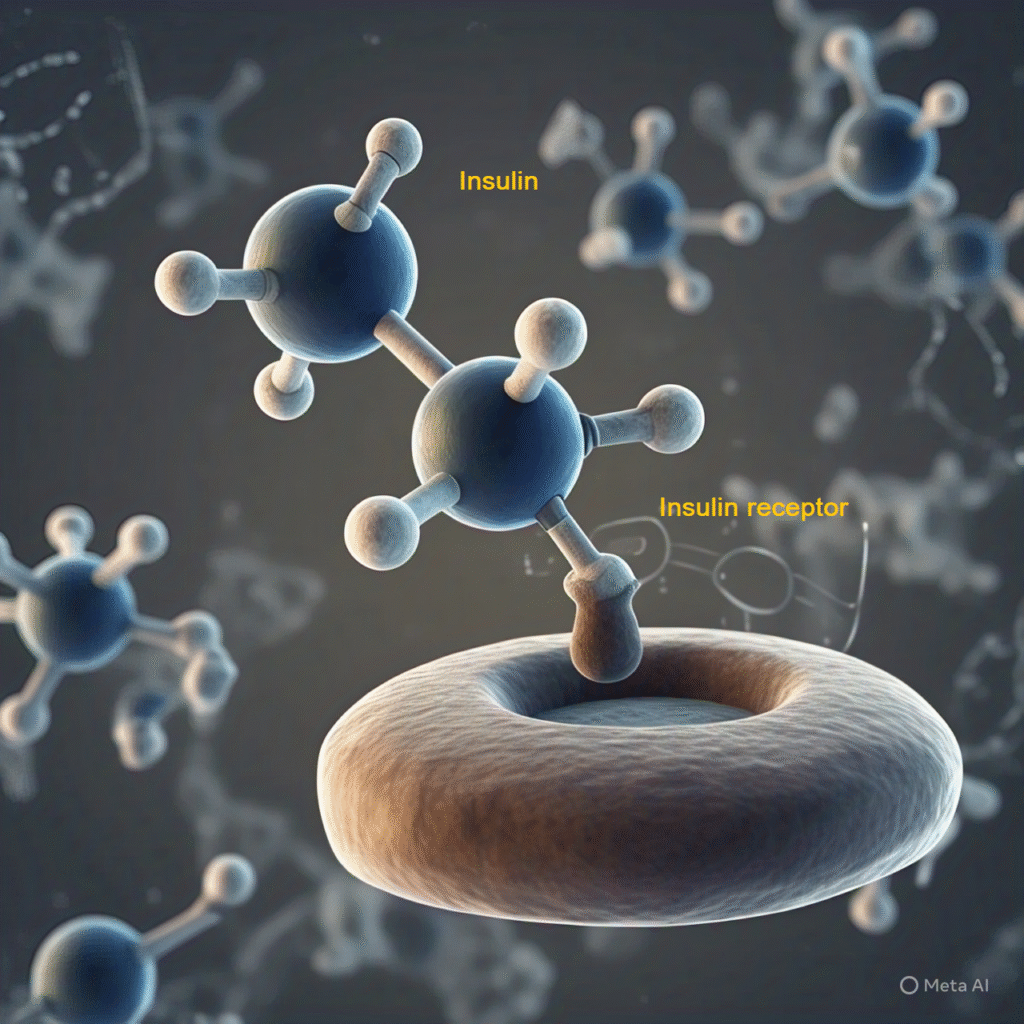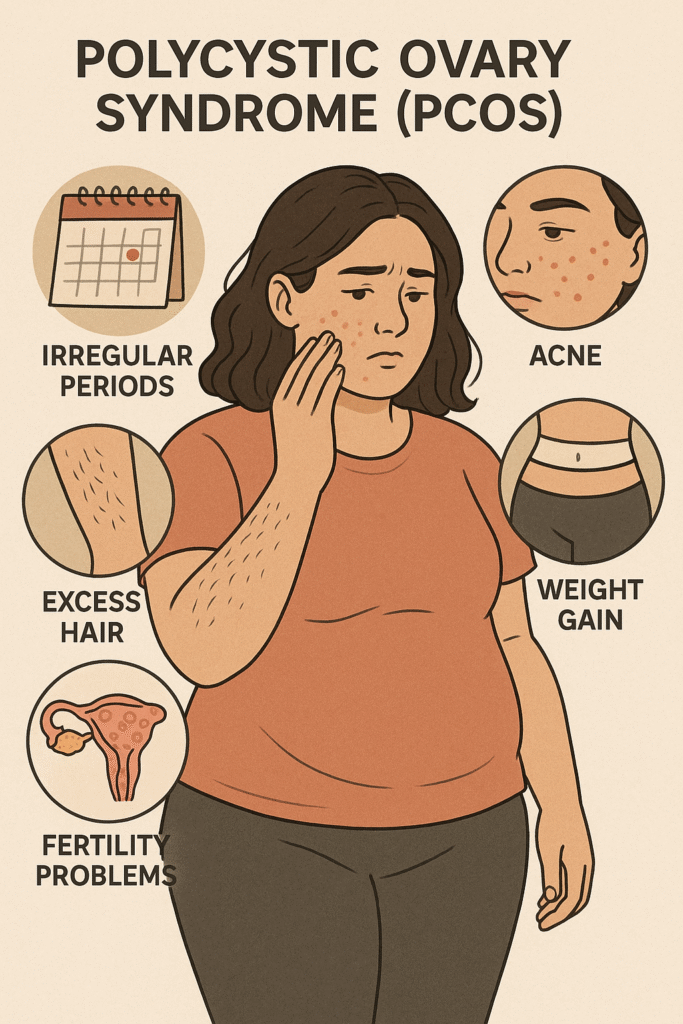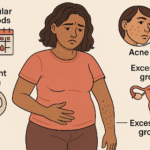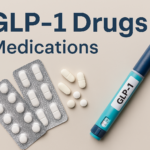
Table of Contents
Polycystic Ovary Syndrome (PCOS) is one of the most common hormonal disorders among women of reproductive age, affecting millions globally. It can cause symptoms like:
- Irregular or absent periods
- Acne and oily skin
- Excess facial or body hair (hirsutism)
- Weight gain or difficulty losing weight
- Fertility issues
These symptoms aren’t just physical—they can deeply affect emotional well-being, confidence, and quality of life.
Because PCOS often involves insulin resistance , many women are exploring natural, science-backed options like inositol for PCOS success stories , seeking relief without harsh medications.
But does inositol really work for PCOS, or is it just hype?
Let’s take a closer look—from what inositol is, to how it works, and why so many women are reporting positive changes.
What is Inositol & How Does It Help PCOS?
Inositol isn’t technically a vitamin—but it’s often called Vitamin B8 due to its vitamin-like properties. It’s a naturally occurring sugar alcohol found in foods like fruits, beans, and grains—and even produced by your own body.
While it is now understood that the human body can produce up to 4 grams of myo-inositol per day, inositol is also naturally present in various foods such as legumes, seeds, oils, and nuts.
Inositol is classified as safe by the FDA, with only mild gastrointestinal side effects—such as nausea, gas, and diarrhea—reported at daily doses exceeding 12 grams.
It plays a key role in cell signaling, especially in how your cells respond to insulin.
According to a 2024 study published in Cureus :
For women with PCOS, this matters enormously—because up to 70% of PCOS patients suffer from insulin resistance .
This is where inositol shines: it helps restore cellular sensitivity to insulin, which can help rebalance hormones and ease many of the hallmark symptoms of PCOS.
🔬 Types of Inositol: Myo-Inositol vs D-Chiro Inositol
Myo-inositol (MI) is the most abundant form of inositol, but other eight isomers exist (scyllo-, muco-, epi-, neo-, allo-, cis-, D-chiro and L-chiro).
There are two main forms of inositol relevant to PCOS:
| Type | Role in PCOS |
|---|---|
| Myo-inositol | Improves insulin sensitivity, supports egg quality, and promotes regular ovulation |
| D-chiro inositol | Helps metabolise androgens (like testosterone), reducing acne and hirsutism |
While our bodies can convert myo-inositol into D-chiro inositol, research suggests that taking both together—in the right ratio —may offer better results.
Research Insight (European Review for Medical and Pharmacological Sciences, 2019):
The 40:1 ratio of myo-inositol to D-chiro inositol mimics the natural balance found in healthy cells. This combination helps restore cellular function and improves insulin signaling—especially important for women with PCOS.
So, when you hear people talk about inositol for PCOS success stories , they’re often referring to this combined approach.
🧪 How Inositol Works for PCOS
PCOS is closely linked to insulin resistance , which disrupts hormone regulation. High insulin levels can trigger increased production of androgens like testosterone, leading to symptoms like:
- Irregular periods
- Ovarian cysts
- Hair loss or unwanted facial hair
- Weight gain
Inositol acts as an insulin sensitizer , helping your body use glucose more efficiently. As a result:
- Androgen levels drop
- Menstrual cycles become more regular
- Symptoms like acne and hirsutism improve
- Fertility potential increases
Now let’s explore how these benefits translate into real-life improvements

🤰A. Fertility & Pregnancy Success Stories: Myo-Inositol for PCOS Pregnancy
For many women with PCOS, fertility is a top concern. Due to irregular or absent ovulation (anovulation), conception can be difficult—even with treatment.
That’s why myo-inositol for PCOS fertility success stories are becoming increasingly popular.
Clinical Evidence:
- Unfer V et al. showed that myo-inositol supplementation effectively improves hormonal and reproductive imbalances in PCOS .
- Etrusco A et al. found that myo-inositol restores ovarian activity and fertility in most PCOS patients. It also enhances egg maturation and embryo development through improved FSH signaling, increasing pregnancy rates.
Even couples undergoing IVF or other assisted reproductive technologies (ART) may benefit from adding inositol to their regimen.
✅ Key takeaway: Inositol helps restore ovulation and improve fertility outcomes in PCOS, making it a valuable tool for natural conception or assisted reproduction.
⚖️ B. Weight Management & Metabolic Improvement: Inositol for PCOS Weight Loss
Weight management is another major challenge for many with PCOS—largely due to insulin resistance. When your body struggles to use insulin properly, it stores more fat—especially around the abdomen—and cravings increase.
This is where inositol for PCOS weight loss results come into play.
Research Insight:
A study in Obesity Science & Practice found that inositol significantly reduced BMI in adults under 30 and those with PCOS , although the clinical effect size was modest. Still, it can be a helpful addition to lifestyle changes like diet and exercise.
A recent review (2024) found that Myo-inositol comprehensively supports PCOS by improving ovarian function, fertility, and metabolic health, while reducing hyperandrogenism and regulating hormonal factors.
By improving insulin sensitivity, inositol helps your body process glucose more efficiently, reduce appetite, and manage cravings—making weight loss more achievable.
✅ Key takeaway: Inositol optimises insulin function, making it easier to manage weight and improve metabolic health in PCOS.
🧠 C. Hormonal Balance & Symptom Relief: Inositol for Mood and Skin
Beyond fertility and weight, PCOS affects hormonal balance in ways that impact mood, skin, and energy levels.
As insulin sensitivity improves with inositol, so do symptoms like:
- Acne and oily skin
- Facial hair growth
- Fatigue
- Mood swings and anxiety
Some studies suggest that inositol may also support mental health by influencing brain chemicals like serotonin and dopamine.
✅ Key takeaway: Inositol supports both physical and emotional well-being in PCOS by balancing hormones and stabilising mood.
📊 Summary Table: Benefits of Inositol in PCOS
| Area of Impact | How Inositol Helps | Supporting Evidence |
|---|---|---|
| Insulin Sensitivity | Improves glucose metabolism | Cureus, |
| Ovulation & Fertility | Enhances follicle development and egg quality | Unfer V et al., Etrusco A et al. |
| Weight Management | Reduces cravings, supports fat metabolism | Obesity Science & Practice |
| Hormonal Balance | Lowers androgens, regulates menstrual cycles | European Review for Medical and Pharmacological Sciences, |
| Mood Support | Modulates neurotransmitters like serotonin | Chengappa et al |
How to Use Inositol Effectively – Dosage, Timing, and Combinations
Recommended Dosage (40:1 Myo/D-Chiro Ratio)
Accoding to the Unfer V et al. :
- 2,000–4,000 mg myo-inositol daily
- 50–100 mg D-chiro inositol (if using a combo)
Best Time to Take It
Split Doses and Meal Timing
- A 2023 systematic review and meta-analysis published in reproductive Biology and Endocrinoly analyzed and confirmed that inositol can be used in divided doses (morning and evening) . The study emphasizes the importance of
- Regular dosing intervals
- Consistent daily amounts
- Administration with meals
but does not identify a superior time of day.
When it comes to combinations, some supplements enhance inositol’s effects. For example:
- Folic acid : Often paired with inositol to support fertility.
- Berberine : Works synergistically with inositol to improve insulin sensitivity.
- Vitamin D : Many women with PCOS are deficient, and supplementing both can improve overall hormonal balance.
- Omega-3 fatty acids : Help reduce inflammation and support heart health alongside inositol.
Always consult with a healthcare provider before starting any new supplement, especially if you’re already on medication or undergoing fertility treatments.
🧬 Final Thoughts: Real Results Backed by Science
Inositol for PCOS success stories aren’t just hype—science backs its benefits for hormones, fertility, and metabolic health. If you’re considering it, start with a 40:1 myo/D-chiro blend and give it at least 3 months to work its magic.
It’s not a miracle cure, but it’s a powerful, safe, and effective tool that many women are using to reclaim control over their health.
FAQs :Inositol for PCOS Success Stories
Can inositol cause weight gain?
No—actually, inositol is more commonly associated with weight stabilisation or modest weight loss , especially when combined with lifestyle changes like diet and exercise.
Is it safe to take inositol while trying to conceive?
Yes, and many fertility specialists recommend it. Studies show that inositol improves egg quality and increases the chances of successful conception , especially in women undergoing assisted reproductive techniques.
Will inositol help if I don’t have PCOS?
Possibly. While most research focuses on PCOS, inositol may benefit anyone with insulin resistance, metabolic syndrome, or mood-related conditions like anxiety and depression.
Are there any side effects?
n general, inositol is very well tolerated. Some people may experience mild digestive upset at higher doses, but this usually resolves with time or by adjusting the dose.
How long does inositol take to work for PCOS?
Most women begin to see noticeable changes after 3–6 months of consistent use . However, individual responses vary.










